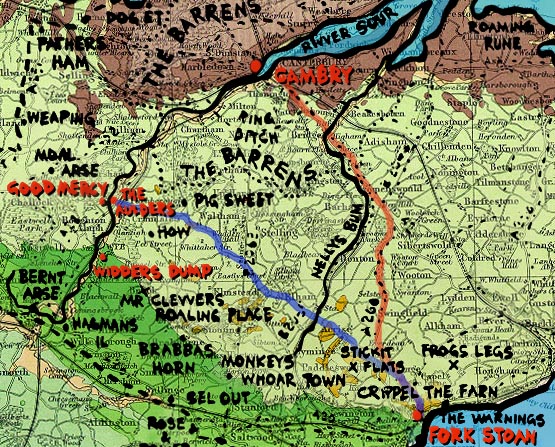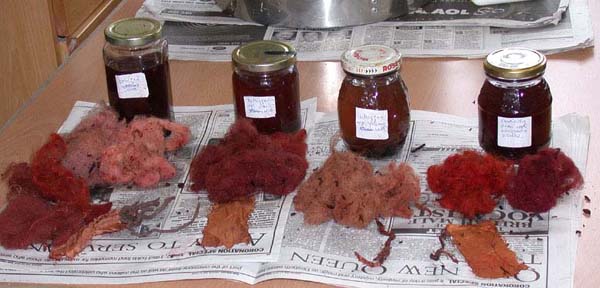
University of California, Irvine
Instructor: Dr. Barbara J. Becker

|
Week 8. Riddley Guide.
|
Who is Granser? Who/what does he represent? What sort of "knowing" does he possess?
|

Riddley returns to Fork Stoan and travels to The Aulders
with Goodparley.
Page 175. "HOAP OF A TREE"
|
|
|
(King James Version) |
| Which theres hoap of a tree if its cut down yet itwl sprout agen. And them tinder branches theyre of wil not seaze. | 7. For there is hope of a tree, if it be cut down, that it will sprout again, and that the tender branch thereof will not cease. |
| Tho the root of it works old in the earf and the stick of it dead on the groun | 8. Though the root thereof wax old in the earth, and the stock thereof die in the ground; |
| yet even jus only the smel of water and itwl bud and bring forit bowing like the plan. | 9. Yet through the scent of water it will bud, and bring forth boughs like a plant. |
Orfing's explanation: "Thats ben the go word of the arper sitting [opposition] in the Mincery year on year it ben past down 1 shadder mincer to the nex. Inland may be cut down yet them branches wil keap coming. Peopl may try to kil them branches only itwl be the peopl what fall down and dy them branches wil grow out of ther moufs which thats our blip and syn."For a largely non-literate people, some members of Inlander society certainly seem to have an abundance of privileged information about the past that has been handed down from one generation to another. Goodparley shared both the written text of "The Legend of St. Eustace" and the unwritten script of an old Punch puppet show with Riddley back in Chapter 14. Now Erny Orfing recites, almost verbatim, text from the King James Version of the Book of Job! He reveals it to be part of an oral tradition passed down from memory by leaders of the opposition within the government--a body of knowledge revered by those in the "shadder mincery" who secretly contest the prevailing party line. The Book of Job is one of the world's oldest works of literature, perhaps THE oldest. It is so old that no one knows for certain when it was written (probably around 2000 BCE) or who wrote it (perhaps Job himself). It is a poetic moral tale of a "perfect and upright" man named Job who is made to endure tragic loss and unspeakable afflictions as the result of a cruel wager between God and Satan. Riddley learns that the Ram is not the monolithic ruling force that it pretends to be! And, that the Eusa story is not the only text on which the rulers and would-be rulers of Inland rely for guidance! What other secrets remain to be uncovered?
Page 187. "Mort your clof with Saul & PeterA mordant is a substance used by dyers to fix a color in a fiber. The word comes from an Old French word mordant, the present participle of the verb mordre, meaning "to bite." Many mordants are acidic or alkaline, and/or have a sharp taste or smell. They work by making it chemically possible for the dye's molecules to bond directly with those of the fiber. Saltpeter, or potassium nitrate (KNO3), can be used as a mordant. A natural red dye can be made from the root of the madder plant, rubia tinctorum.
Drawing of red madder plant (Rubia tinctorum)
showing its flowers, leaves and root.
Exposed root of a red madder plant.
Dried red madder roots.
|

Page 191. "'That's the woal seakert of the 1 Littl 1 you see.'Riddley was already aware that the dyers and chard coal berners provide useful products, but during his stay with Granser, he discovers that they possess and make use of a different kind of knowledge from other Inlanders. For individuals like Riddley who grew up in How Fents, opportunities to interact with Eusa folk, Mincery officials, formers, chard coal berners, and dyers are limited. The specialized knowledge each group possesses may complement that of the others, but it is rarely, if ever, shared. |
|